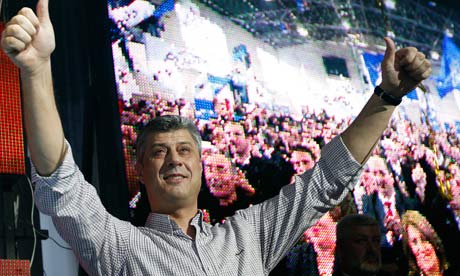Kosovo 'crime ring': police to examine allegations against PM Hashim Thaçi
Thaçi could face prosection if EU-sponsored force finds enough evidence to back up drug and organ trafficking claims
- Paul Lewis in Skopje
- guardian.co.uk, Wednesday 15 December 2010 19.03 GMT
- Article history
 Hashim Thaçi celebrates his victory in elections last weekend. Photograph: Valdrin Xhemaj/EPA
Hashim Thaçi celebrates his victory in elections last weekend. Photograph: Valdrin Xhemaj/EPAKosovo's EU-sponsored police force said today it would examine allegations that the country's prime minister is the head of a "mafia-like" criminal network linked to organ trafficking.
Hashim Thaçi's government denounced the findings of a Council of Europe investigation into organised crime in the country as "slanderous". The Guardian understands that if there is sufficient evidence against Thaçi or the other senior government figures implicated in the report, they could face prosecution.
A legal source said this was the case even though most crimes are alleged to have taken place in Albanian territory.
Kosovo's EU police and justice mission (Eulex), which took over security issues from the United Nations three years ago, indicated the report would be looked at. Andy Sparkes, deputy head of Eulex, added: "If they have got chapter and verse on this kind of thing, then obviously we would like to hear from them more formally so that we can deal with it."
The report, which will be presented to 47 member states at a meeting in Paris, accuses Thaçi of being the "boss" of a faction within the Kosovo Liberation Army responsible for serious crimes. The most explosive claims concern the smuggling of Serb captives into northern Albania, where a handful were said to have been murdered before their kidneys were sold on the black market. Thaçi is named 27 times in the report, the findings of which were revealed yesterday by the Guardian.
Citing the FBI and other intelligence, it accuses him of exerting "violent control over the heroin and narcotics trade". Thaçi, a former guerrilla leader, was re-elected as prime minister on Sunday.
Kosovo was a UN protectorate until three years ago, when the country declared independence from Serbia.
The Council of Europe's two-year inquiry was led by Dick Marty, a human rights rapporteur. His findings are said to have sparked a diplomatic crisis behind the scenes. Russia is understood to have sent urgent cables to Pristina, demanding to know the identity of any nationals who have fallen victim to organ trafficking.
Serbia said the reports raised questions about Thaçi's suitably as the country's leader. Serbia's foreign minister, Vuk Jeremic, called the report "a signal for the civilised world community to stop turning their backs to the terrible situation in Kosovo; this report shows what Kosovo is and who is leading it".
The report has received less attention in Kosovo, where journalists critical of the government have received death threats, than in the rest of the world.
Details of the report were contained in some newspapers, although the state television made no mention that the prime minister had been linked to organised crime in its main news bulletin.
Pristina-based analysts said the report was being viewed sceptically in the country.
Thaçi's government said in a statement: "The allegation published by the Guardian had been investigated several times by local and international judiciary, and in each case, it was concluded that such a statement were not based on facts and were construed to damage the image of Kosovo and the war of the KLA."
Inga kommentarer:
Skicka en kommentar